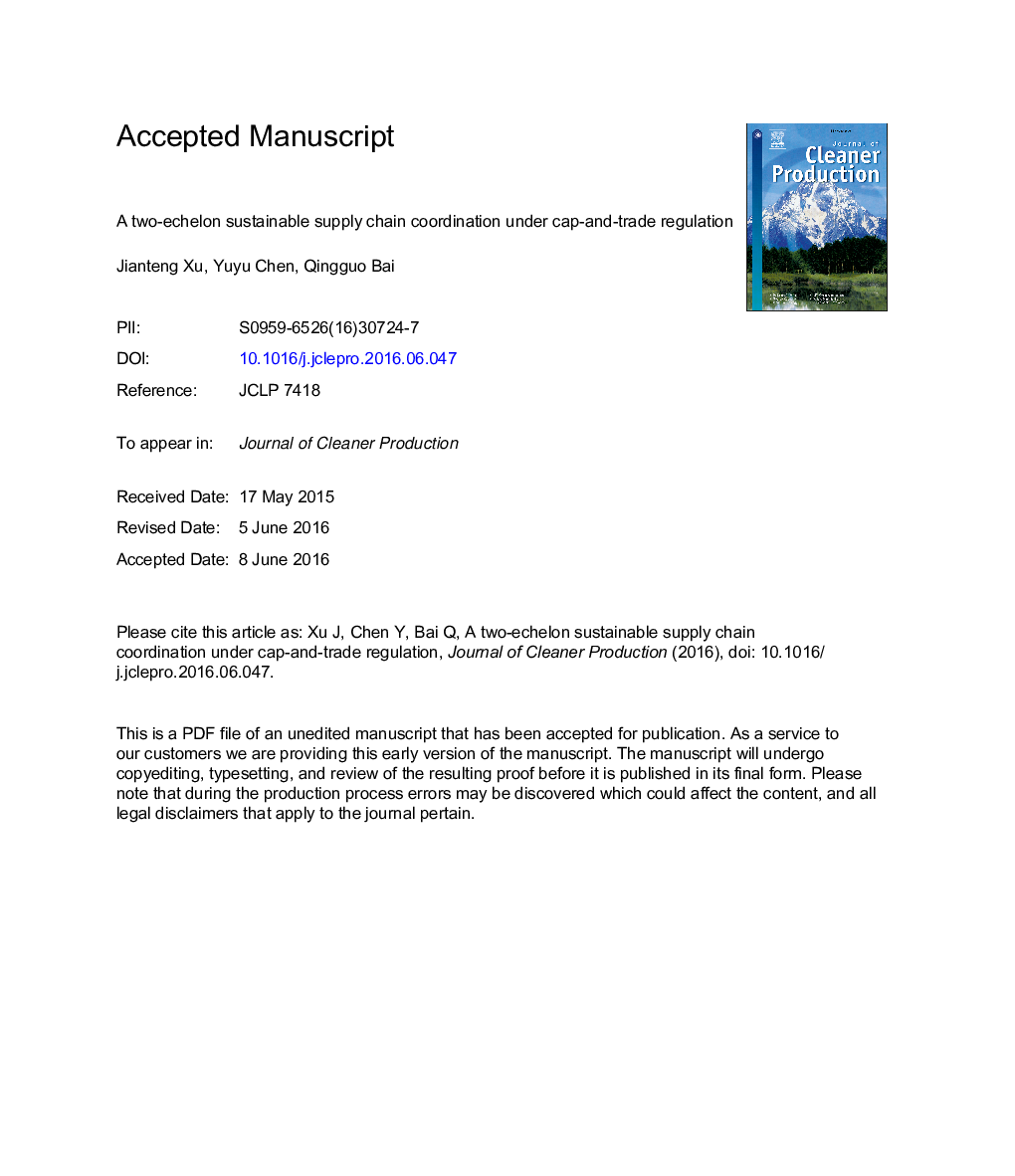| کد مقاله | کد نشریه | سال انتشار | مقاله انگلیسی | نسخه تمام متن |
|---|---|---|---|---|
| 8101103 | 1522115 | 2016 | 23 صفحه PDF | دانلود رایگان |
عنوان انگلیسی مقاله ISI
A two-echelon sustainable supply chain coordination under cap-and-trade regulation
ترجمه فارسی عنوان
هماهنگی زنجیره تأمین دو جانبه تحت مقررات کلاهبرداری و تجارت
دانلود مقاله + سفارش ترجمه
دانلود مقاله ISI انگلیسی
رایگان برای ایرانیان
کلمات کلیدی
هماهنگی زنجیره تامین، بسته و تجارت، قیمت فروش، سرمایه گذاری پایدار،
ترجمه چکیده
در این مقاله، رفتار تصمیم گیری و مکانیسم های هماهنگی برای یک زنجیره تامین پایدار دوگانه تحت مقررات کلاهبرداری و تجارت تجزیه و تحلیل می شود. در یک ترتیب مرتب سازی، انتشار کربن به واسطه فرایند تولید پایین دست تولید می شود و تقاضای بازار زنجیره تامین بر دو متغیر تصمیم، سطح پایداری و قیمت فروش اثر می گذارد. تأثیر هزینه معامله فروش واحد بر متغیرهای تصمیم مطلوب در سیستم های متمرکز و غیر متمرکز نشان داده شده است. مقایسه سیستم های غیر متمرکز و متمرکز نشان می دهد که افزایش سود کل در سیستم متمرکز بیش از 1/3 در سیستم غیر متمرکز است. برای دستیابی به همان سود به عنوان سیستم متمرکز، ما دو قرارداد را برای هماهنگی زنجیره تامین پایدار، اشتراک درآمد و قراردادهای معادل دو بخشی در نظر می گیریم. با تجزیه و تحلیل شرایط برای نتیجه برنده، ما ثابت می کنیم که تنها قرارداد تعرفه دو جانبه می تواند منجر به هماهنگی کامل شود. در نهایت، تجزیه و تحلیل حساسیت پارامترهای کلیدی به عنوان بخشی از یک مثال عددی که نتایج نظری را نشان می دهد، انجام می شود.
موضوعات مرتبط
مهندسی و علوم پایه
مهندسی انرژی
انرژی های تجدید پذیر، توسعه پایدار و محیط زیست
چکیده انگلیسی
This paper analyses the decision behaviour and coordination mechanisms for a two-echelon sustainable supply chain under a cap-and-trade regulation. In a make-to-order setting, carbon emissions are generated primarily by the downstream manufacturing process, and the market demand of the supply chain is affected by two decision variables, the sustainability level and the selling price. The impact of the unit emissions trading price on the optimal decision variables in both centralized and decentralized systems is revealed. The comparison of decentralized and centralized systems shows that the increase in total profit in centralized system is at most 1/3 that in decentralized system. To achieve the same profit as the centralized system, we consider two contracts to coordinate the sustainable supply chain, revenue-sharing and two-part tariff contracts. By analysing the conditions for a win-win outcome, we prove that only the two-part tariff contract can lead to perfect coordination. Finally, sensitivity analysis of the key parameters is undertaken as part of a numerical example illustrating the theoretical results.
ناشر
Database: Elsevier - ScienceDirect (ساینس دایرکت)
Journal: Journal of Cleaner Production - Volume 135, 1 November 2016, Pages 42-56
Journal: Journal of Cleaner Production - Volume 135, 1 November 2016, Pages 42-56
نویسندگان
Jianteng Xu, Yuyu Chen, Qingguo Bai,
